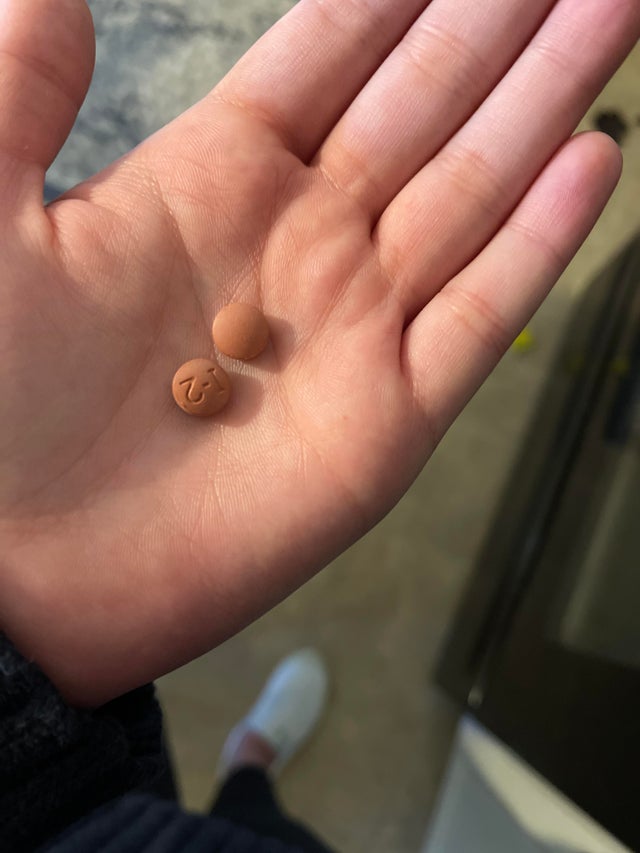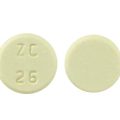The brown, round pill with the imprint I-2 has been identified as Ibuprofen 200 mg supplied by Major Pharmaceuticals Inc.. I-2 pill is an NSAID, which is a type of medication with analgesic, fever-reducing, and, in higher doses, anti-inflammatory properties. The I-2 pill is used to treat:
- fever
- inflammation
- headache
- menstrual pain
- the common cold
- toothache
- back pain
- arthritis
- sprains.
The World Health Organization (WHO) includes ibuprofen on its list of essential medicines. The list states the minimum medical needs for a basic healthcare system. It works by reducing hormones that cause pain and swelling in the body.
How to use I-2 pill
Read all directions on the product package before taking this medication. If your doctor has prescribed this medication, read the Medication Guide provided by your pharmacist before you start taking I-2 pill and each time you get a refill. If you have any questions, ask your doctor or pharmacist.
Take this medication by mouth, usually every 4 to 6 hours with a full glass of water (8 ounces/240 milliliters) unless your doctor directs you otherwise. Do not lie down for at least 10 minutes after taking this drug. If you have stomach upset while taking this medication, take it with food, milk, or an antacid.
The dosage is based on your medical condition and response to treatment. To reduce your risk of stomach bleeding and other side effects, take this medication at the lowest effective dose for the shortest possible time. Do not increase your dose or take this drug more often than directed by your doctor or the package label. For ongoing conditions such as arthritis, continue taking this medication as directed by your doctor.
For certain conditions (such as arthritis), it may take up to two weeks of taking this drug regularly until you get the full benefit.
If you are taking this drug “as needed” (not on a regular schedule), remember that pain medications work best if they are used as the first signs of pain occur. If you wait until the pain has worsened, the medication may not work as well.
If your condition persists or worsens, or if you think you may have a serious medical problem, get medical help right away. If you are using the nonprescription product to treat yourself or a child for fever or pain, consult the doctor right away if fever worsens or lasts more than 3 days, or if pain worsens or lasts more than 10 days.
What are the side effects of I-2 pill?
I-2 pill may cause side effects. Tell your doctor if any of these symptoms are severe or do not go away:
- constipation
- diarrhea
- gas or bloating
- dizziness
- nervousness
- ringing in the ears
Some side effects can be serious. If you experience any of the following symptoms, call your doctor immediately. Do not take any more ibuprofen until you speak to your doctor.
- unexplained weight gain
- shortness of breath or difficulty breathing
- swelling of the abdomen, feet, ankles, or lower legs
- fever
- blisters
- rash
- itching
- hives
- swelling of the eyes, face, throat, arms, or hands
- difficulty breathing or swallowing
- hoarseness
- excessive tiredness
- pain in the upper right part of the stomach
- nausea
- loss of appetite
- yellowing of the skin or eyes
- flu-like symptoms
- pale skin
- fast heartbeat
- cloudy, discolored, or bloody urine
- back pain
- difficult or painful urination
- blurred vision, changes in color vision, or other vision problems
- red or painful eyes
- stiff neck
- headache
- confusion
- aggression.
Ibuprofen may cause other side effects. Call your doctor if you have any unusual problems while taking this medication.
If you experience a serious side effect, you or your doctor may send a report to the Food and Drug Administration’s (FDA) MedWatch Adverse Event Reporting program online (http://www.fda.gov/Safety/MedWatch) or by phone (1-800-332-1088).
What medication can interact with I-2 pill?
Drug interactions may change how your medications work or increase your risk for serious side effects. This document does not contain all possible drug interactions. Keep a list of all the products you use (including prescription/nonprescription drugs and herbal products) and share it with your doctor and pharmacist. Do not start, stop, or change the dosage of any medicines without your doctor’s approval.
Some products that may interact with I-2 pill include: aliskiren, ACE inhibitors (such as captopril, lisinopril), angiotensin II receptor blockers (such as losartan, valsartan), cidofovir, corticosteroids (such as prednisone), lithium, “water pills” (diuretics such as furosemide).
This medication may increase the risk of bleeding when taken with other drugs that also may cause bleeding. Examples include anti-platelet drugs such as clopidogrel, “blood thinners” such as dabigatran/enoxaparin/warfarin, among others.
Check all prescription and nonprescription medicine labels carefully since many medications contain pain relievers/fever reducers (including aspirin, NSAIDs such as celecoxib, ketorolac, or naproxen). These drugs are similar to ibuprofen and may increase your risk of side effects if taken together. However, if your doctor has directed you to take low-dose aspirin for heart attack or stroke prevention (usually 81-162 milligrams a day), you should continue taking the aspirin unless your doctor instructs you otherwise. Daily use of ibuprofen may decrease aspirin’s ability to prevent heart attack/stroke. Talk to your doctor about using a different medication (such as acetaminophen) to treat pain/fever. If you must take ibuprofen, talk to your doctor about taking immediate-release aspirin (not enteric-coated/EC) while taking ibuprofen. Take ibuprofen at least 8 hours before or at least 2 hours after your aspirin dose. Do not increase your daily dose of aspirin or change the way you take aspirin/other medications without your doctor’s approval.







